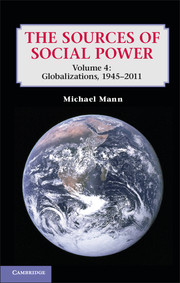Book contents
- Frontmatter
- Contents
- 1 Globalizations
- 2 The postwar global order
- 3 America in war and cold war, 1945–1970
- 4 U.S. civil rights and identity struggles
- 5 American empire during the cold war, 1945–1980
- 6 Neoliberalism, rise and faltering, 1970–2000
- 7 The fall of the Soviet alternative
- 8 The Maoist alternative reformed
- 9 A theory of revolution
- 10 American empire at the turn of the twenty-first century
- 11 Global crisis
- 12 Global crisis
- 13 Conclusion
- Bibliography
- Index
9 - A theory of revolution
Published online by Cambridge University Press: 05 January 2013
- Frontmatter
- Contents
- 1 Globalizations
- 2 The postwar global order
- 3 America in war and cold war, 1945–1970
- 4 U.S. civil rights and identity struggles
- 5 American empire during the cold war, 1945–1980
- 6 Neoliberalism, rise and faltering, 1970–2000
- 7 The fall of the Soviet alternative
- 8 The Maoist alternative reformed
- 9 A theory of revolution
- 10 American empire at the turn of the twenty-first century
- 11 Global crisis
- 12 Global crisis
- 13 Conclusion
- Bibliography
- Index
Summary
I have defined a revolution as a popular insurgent movement that overthrows a ruling regime and then transforms substantially at least three of the four sources of social power – ideological, economic, military, and political. A political revolution is one that only changes political power relations, as happened in 1911 in China, and as the 2011 Arab Spring attempted to do. I gave fuller explanations of the main twentieth-century revolutions – successful and unsuccessful – in Volume 3 and added a little more about post–World War II Latin American and Asian cases here in Chapter 5. Chapter 7 presented what was initially a revolution from above in the fall of the Soviet Union, and I will spend some time discussing the special case of the Iranian revolution of 1979 later in this chapter. Other chapters have discussed the development of the main reformist alternatives to revolution through the century. From all of this some broad comparative and historical generalizations, amounting to an approximate theory of revolution, are possible, though history always presents new challenges to revolutionaries and counterrevolutionaries alike. These generalizations involve all four sources of social power.
First, in the twentieth century revolutions up to the Iranian revolution of 1979 successful insurgent leaders embraced Marxist theories of class exploitation, struggle, and revolutionary transformation, though they did not always do this at the beginning of their struggle while Marxism proved a supple ideological instrument in their hands. A substantial component of ideological power was necessary for modern revolutions, for this gave a vision of the march of history, which solidified an insurgent ideological power elite and drove them on to take highly risky actions during insurgency and wholesale social transformations after they seized power. This meant that the insurgents kept sight of their ultimate transformative goals even while engaging in pragmatic, reformist actions in the present, as was notably so among the Chinese communists. It also ensured that seizing political power was not the end of the revolution. These revolutionaries did not settle down into comfortable enjoyment of power but driven on by their ideology sought to transform the other sources of power.
- Type
- Chapter
- Information
- The Sources of Social Power , pp. 246 - 267Publisher: Cambridge University PressPrint publication year: 2012



